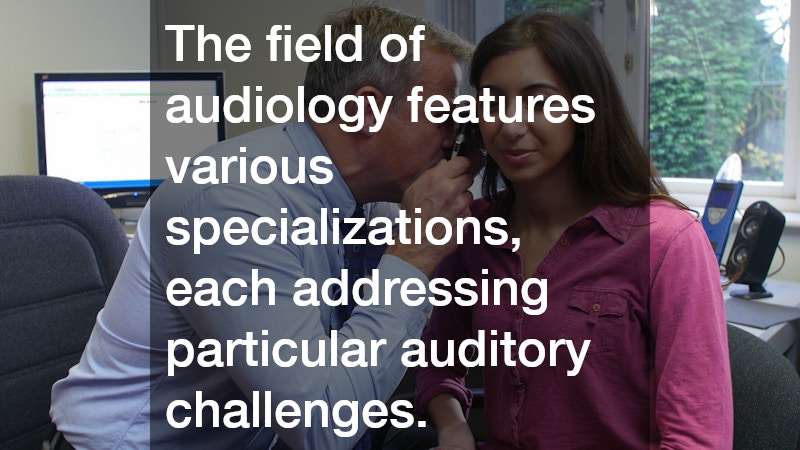This section provides an overview of the crucial role audiologists play in diagnosing and treating hearing-related issues. Learn about the importance of audiology and the impact audiologists have on improving patients’ quality of life.
What Does an Audiologist Do?
Diagnosis and Assessment
Audiologists employ a range of techniques to accurately diagnose hearing conditions, a fundamental aspect of effective treatment. These methods include a variety of audiometric tests that allow them to measure hearing acuity and sensitivity across different frequencies.
Audiometric evaluations are essential for identifying the type and extent of hearing loss someone is experiencing. This process helps in crafting a comprehensive understanding of the patient’s auditory profile, which is necessary for effective intervention.
Through detailed diagnostic assessments, audiologists can tailor their approaches to suit each individual’s needs. These initial evaluations lay the groundwork for all subsequent treatments and interventions, offering insight into the most appropriate therapies.
Treatment and Management
Once a diagnosis is established, audiologists offer several treatment options to manage hearing loss effectively. Hearing aids are common devices prescribed to amplify sounds and facilitate better communication for those with hearing impairments.
For individuals with severe hearing loss, cochlear implants may be an option, providing a solution when traditional hearing aids prove insufficient. Additionally, audiologists offer auditory rehabilitation to help clients adjust to their devices and optimize their listening skills.
By focusing on individual needs, audiologists create personalized management plans that enhance their patients’ quality of life. These tailored treatment programs are integral to addressing specific auditory challenges and improving daily communication.
Why Visit an Audiologist?
Recognizing Hearing Loss Symptoms
Recognizing the symptoms of hearing loss early is crucial for timely intervention by an audiologist. Common signs include difficulty understanding speech in noisy environments and frequently asking others to repeat themselves.
Hearing changes can develop gradually, so it’s essential to seek professional advice if you notice persistent issues. Audiologists are equipped to assess these symptoms and determine the appropriate course of action to address hearing concerns.
Proactive management of hearing health through regular check-ups can prevent further deterioration. Early consultations lead to better management strategies and a higher quality of life through improved communication.
Preventive Care and Advice
Audiologists not only treat hearing loss but also offer valuable advice on preventive measures to maintain ear health. Protecting your ears from excessive noise exposure is a primary step in preventing hearing impairment, and audiologists can guide you in using protective gear.
Regular hearing evaluations are recommended to monitor ear health, especially for those exposed to high noise levels or with a family history of hearing loss. Audiologists emphasize the importance of a healthy lifestyle that includes nutrition and avoiding ototoxic medications to preserve hearing.
Preventive care is key in managing potential hearing issues before they become significant problems. By following audiologists’ advice, individuals can maintain optimal auditory health and prevent the onset or progression of hearing complications.
What to Expect During an Audiologist Appointment?
Initial Consultation
During your first visit to an audiologist, the initial consultation will include an in-depth discussion of your medical history. This conversation is vital for identifying factors that may contribute to hearing concerns and tailoring the assessment accordingly.
The audiologist will also address specific hearing concerns and symptoms you may be experiencing. This dialogue helps in understanding the personal impact of hearing issues and sets the stage for targeted diagnostic tests.
The initial consultation is an opportunity to establish a rapport with your audiologist, ensuring open communication throughout your care. Building this relationship is crucial for ongoing support and effective management of your auditory health.
Comprehensive Hearing Tests
Following the initial consultation, specific hearing tests are conducted to assess your auditory capabilities. These tests are critical in formulating an effective treatment plan that addresses your unique hearing profile.
An evaluation may include pure-tone audiometry, speech testing, and tympanometry to gain a complete picture of your hearing health. The results guide the audiologist in determining appropriate interventions and managing any identified hearing loss.
Comprehensive testing ensures that any hearing impairments are accurately identified and effectively addressed. Through these evaluations, audiologists can provide tailored advice and interventions to enhance auditory well-being.
How to Choose the Right Audiologist?
Evaluating Qualifications and Experience
When selecting an audiologist, it’s essential to consider their qualifications and experience to assure you receive the best care. Board certifications and a solid educational background indicate a commitment to maintaining high professional standards.
Furthermore, an audiologist’s experience in dealing with a range of hearing issues can significantly impact the quality of care provided. Experienced professionals bring a depth of practical knowledge that’s invaluable in tailoring treatments to individual needs.
Choosing an audiologist whose credentials and experience align with your specific hearing needs ensures optimal outcomes. Thoroughly researching and evaluating these factors contributes to a successful partnership in managing your auditory health.
Understanding Specializations
The field of audiology features various specializations, each addressing particular auditory challenges. Pediatric audiologists, for instance, focus on hearing issues in children, making sure to detect and intervene early for developmental success.
Other audiologists might focus on areas like tinnitus management or auditory processing disorders, providing authority care tailored to these conditions. Understanding these specializations is crucial in selecting an audiologist who can effectively address your unique hearing concerns.
This section summarizes the key takeaways about audiologists, emphasizing their experience in making sure auditory health and providing personalized care for hearing impairments. With their specialized skills, audiologists play a vital role in improving communication and quality of life for those experiencing hearing challenges.
